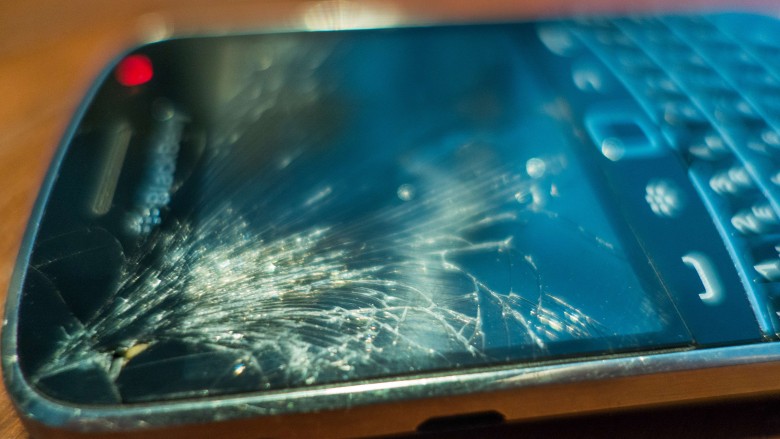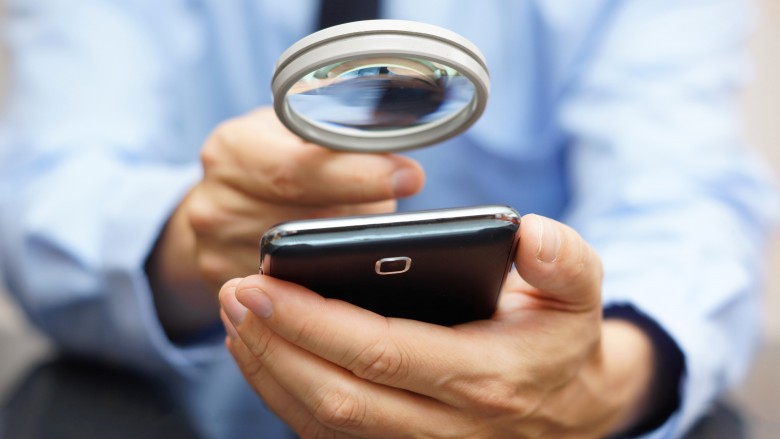Ways Your Cell Phone Company Is Scamming You
intro
Cell phone bills are seemingly more consumer-friendly and easier to understand these days, what with unlimited data deals becoming more prevalent, as well as the demise of traditional two-year contracts. Unfortunately, it's like looking at an Impressionist painting. It appears great from a distance, but up close, it's all blurry. There are still a lot of ways your cell phone company could be ripping you off. Let's take a look at what you need to know when it comes to your friendly neighborhood telephony dealers:
Phone companies are recalculating data numbers to their benefit
Teresa Dixon Murphy, consumer columnist for the Cleveland Plain Dealer, noticed something crazy on her phone bill in 2016. Her family's data usage on their Verizon phone plan had doubled from February to July, without any apparent change in habits. She wasn't the only one — the writer surveyed both friends and readers, and discovered something in common. "All have seen their data use jump significantly," she said, "doubling or tripling since the spring in many cases, even though their cell phone habits haven't changed."
Murphy wrote that "Verizon is tallying data on people's accounts when they are sleeping and not using their phones," and that "data is being used when their phones are off" as well as even "when the phone's owner has died." No joke. The article wondered why the phone of reader Joyce Shinn's late husband is ringing up data when he is deceased. Apparently, they don't have wi-fi in the afterlife.
The author interviewed Verizon executives, who couldn't seem to explain what was going on. Murphy remains very skeptical, pointing out Verizon had to pay out nearly $80 million a few years ago, to settle allegations it charged customers for data they didn't actually use. And according to WGN, consumers have had issues with the way other cell phone companies recently started calculating data as well.
One of the culprits could be the infamous iPhone Wi-Fi Assist button, where Apple automatically switches you to use cellular data if the connection is weak. But that doesn't explain everything. In the meantime, click here to learn how to turn that function off.
The Jitterbug phone targeted to seniors is crazy expensive
Older people in the market for a cell phone that's easy to use might be considering a Jitterbug phone. The phones are relentlessly marketed on TV to seniors, so if you've ever binge-watched Murder, She Wrote or Matlock on broadcast television, chances are you've seen the ads. The phones come with big buttons, a good speaker, and an easy-to-navigate menu. There is also a special 5Star service for seniors to easily connect to emergency responders, and where they can easily be tracked.
The JItterbug phone rates look reasonable, too, on the surface, with the phones themselves starting at $74.99 and monthly rates beginning at $14.99 a month for 200 minutes of calls. But that doesn't include all the fees that GreatCalls, the company that sells Jitterbug, charges to get started. There's a $35 "activation fee" and an additional $10 shipping fee to get the phone to you. Worst of all, there's an outrageous 35 cents a minute if the user goes over their monthly minutes. That's ridiculous, but unfortunately, some of the seniors who this phone is targeted to may not realize what a ripoff that is, as they're new to the world of cell phones.
Also, if you comparison shop, you'll see that you can get unlimited talk and text from other carriers for as little as $25. You can also find per-minute phone companies for under $10 a month for prepaid service. And some low-income seniors might even be able to get cell phone service for free.
Oh, and that 5Star emergency response service, which costs extra, has all sorts of caveats in the legalese, where it acknowledges it could take longer than simply calling 911. You may want to, ahem, jitterbug away from this company.
Phone companies' protection plans can be ripoffs
Now that the days of getting a cheap smartphone deal in exchange for a long contract are ending, the idea of having a protection plan is very appealing. And paying a little extra each month — like around $10 a month or so — for this insurance seems a lot less onerous than paying a lot of money out of pocket for a replacement phone.
But as CNET notes, these deals might not be so great. "If you make one claim per year, you'll pay between $270 and $330 for a new phone," the site notes. And guess what? That "new" phone may actually be a used one, because buried in all that fine print is the fact that "the insurance company has the right to choose whether they want to repair your phone or replace it with one of equal value, which means you're likely to get a refurbished phone instead of a brand new one."
The site says the only advantage these protection plans have over paying for AppleCare+ or other extended manufacturers' warranty policies is that you're covered for theft. Otherwise, they don't appear to be worth it. In the meantime, make sure to get a good case for your phone to protect against drops and spills. That can lessen the need for a replacement phone in the first place.
You have to pay a lot of unknown extra fees
It's bad enough that there are an average of nearly 18% in taxes that you have to pay for your cell phone bill. But there a slew of extra charges as well. For example, the phone companies pass on things like them having to comply with governmental regulations to the consumer. If only consumers could bill them back for the pain of having to figure out their bills every month.
There's also the federal Universal Service Fund to pay for rural areas and low-income customers to get phone coverage. Phone companies could also pay this themselves, but it's easier to make their paying customers do so. Unfortunately, there's not much you can do about this, other than to be aware.
Cell phone cramming still goes on
This is when you get mysterious extra charges on your cell phone bill. Cramming is an old problem from back in the heyday of landlines, where charges you didn't authorize are "crammed" on your bill. But it's still been happening in recent years, and all of the major phone companies have been caught allowing it.
The way this often works is that you think you are signing up to get "free" text messages, and then you're hit with a charge on your bill. In the case of Sprint, the Consumer Financial Protection Bureau explained that their billing system "attracted and enabled unscrupulous merchants who, in some cases, only needed consumers' phone numbers to cram illegitimate charges onto wireless bills." The charges ranged from between 99 cent charges to $9.99 a month subscriptions. And the federal agency said that "Sprint received a 30-40 percent cut of the gross revenue from these charges." Shocker.
But all of the major phone companies have been caught doing this, as a long list on the Federal Trade Commission's website shows. To protect yourself, be very careful about what companies you share your cell phone number with, and pay attention to your bill each month.
You might have to pay extra to get a better phone
Not only do you have to pay the cost of buying your upgraded phone, but you might have to pay extra for the privilege of switching to it. Because switching the number from one device to another and moving the SIM card takes the intellectual efforts of a physics professor and the expert dexterity of a brain surgeon, you see.
For example, in 2017, Verizon raised their fee to upgrade a phone with them from $20 to $30. They told Ars Technica that "these fees help cover increased cost to provide customers with America's largest and fastest 4G LTE network." Yet the site pointed out that, according to their own earning reports, Verizon's capital and operating expenses have decreased, not increased. After this report ran, Verizon then claimed the fees paid for "ongoing costs to maintain and enhance the network," Isn't that what people's regular phone bills should be going towards in the first place?
They're not the only ones charging such fees, of course. Your best bet when getting a new phone is to ask the phone company to waive the activation fee for you, or else you might take your business elsewhere. It's worth a try.
You could get stuck with the bill if your phone is hacked
You may think that phone hacking is only something that the Jennifer Lawrences of the world have to worry about. But getting celebrity nude pix isn't the only reason hackers might go after a mobile phone. Crooks can hack into your mobile phone, ring up all sorts of charges on it, and leave you holding the bill.
This is what happened to Nathan Wright of Hendersonville, TN in 2016. In November 2016, he received a phone bill from AT&T for an incredible $29,206.19. He got charged for 8,280 minutes in roaming charges for using the phone in Haiti and European cities — he doesn't even have a passport, and certainly never traveled to these places. Although he went to his local AT&T store to swap out his SIM card and change his password, they didn't resolve the bill situation, which had by then jumped to $29,577.51. As of January 2017, AT&T still hadn't fixed the bill. How difficult is this to prove that the man didn't make the charges?
So add "having your phone hacked by criminals" as something else you need to worry about these days. Lovely.
Phone companies don't do enough about identity thieves
NBC News reports that identity thieves can pretend to be you, go to a branch of your phone company's store, buy new phones under your account, sell them to make quick cash, and stick you with the bill. They might even take control of your phone number, by switching it to something they control.
That sounds far-fetched, but it's actually happened to multiple people. Like Lorrie Cranor, who told NBC News that both she and her husband's phone stopped working on the same day. She originally thought it was just a weird coincidence — unfortunately, they were victims of identity theft. "We found out that someone had gone into the phone store in another city with a fake ID and said they wanted to upgrade their phones," Cranor told NBC News. "They walked out with two brand new iPhones with our phone numbers on them and charged to our account."
Her story shows this could happen to anybody. After all, she is "the chief technologist for the Federal Trade Commission," the report notes. So yes, even those who work at a federal agency, one with a mission to protect Americans against such things, can get hosed.
Cranor wrote a warning on the FTC website explaining her story. "The representative agreed to remove the charges," she wrote, "but blamed the theft on me." Awesome — nothing like victim-shaming on the federal level. She recommended that customers get an extra PIN or password put on their account for additional security, but acknowledged that this may not be foolproof.
Your GPS records can go to law enforcement without you knowing
Thanks to the GPS function on phones, your smartphone provides a great record of where you've been, who you've been with, what you like to do, etc. Even how much you walk or run can be tracked. So yes, people can know whether you have been a coach potato.
That means all this info can be a great tool for law enforcement. Worse, they may potentially be able to use it without a search warrant. The Intercept reported that in 2016, the 4th Circuit Court of Appeals gave a big legal thumbs-up to "the third-party doctrine." That doctrine states that "consumers who knowingly and willingly surrender information to third parties therefore have 'no reasonable expectation of privacy' ... regardless of how much information there is, or how revealing it is." In short, because you agreed to sign up for your phone and give this information, law enforcement may not need a warrant before contacting your phone company to get this info. The American Civil Liberties Union has a map that shows how your state's laws might protect you, though. Study it carefully — you might need it one day.









